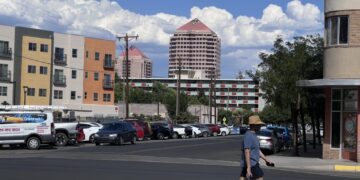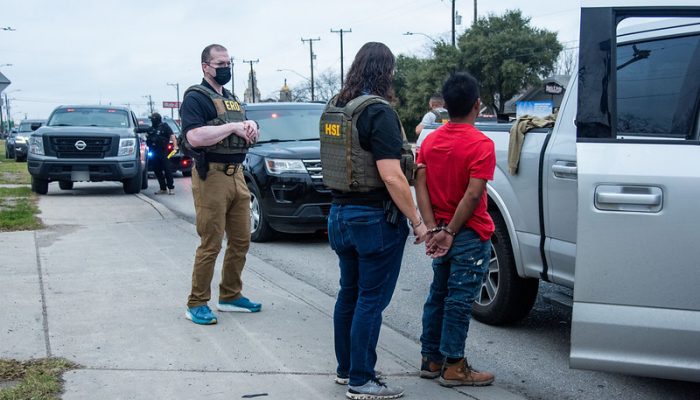Thirty-four cities and counties, including Chicago and Los Angeles, have asked to join a California lawsuit seeking to stop the Trump administration from cutting federal funding based on sanctuary policies that limit cooperation with the administration’s mass deportation agenda.
The expansion of the case could be a sign that more cities are seeing the benefit of suing to protect their rights in court from a Trump administration that is often acting without regard for legal precedent. A recent U.S. Supreme Court ruling that significantly limits nationwide injunctions means that cities and states must be part of a lawsuit to get the benefits of any injunction that would stop such policies while the legal merits are debated in court.
NM immigration rights groups decry Trump list of NM sanctuary counties, cities
The federal judge in the case, William Orrick of the U.S. District Court of Northern California, did issue an injunction April 24, telling the Trump administration it couldn’t use executive orders to withhold federal funding from the original 15 cities and counties in the lawsuit. Orrick updated the injunction June 23 to include later policy memos tying “all new federal awards” to immigration compliance. The Trump administration said it would appeal the injunction.
“It appears that the defendants continue to seek an end run around the preliminary injunction,” Orrick wrote in June. Orrick left the door open for the administration to withhold funds directly tied to illegal immigration, but he said the administration still must make a case that there’s a real connection between immigration and other issues — especially with seemingly unrelated programs like highway and housing funds.
Albuquerque seeks to join suit; Santa Fe already part of challenge
The City of Albuquerque is one of the cities seeking to join the challenge to the Trump administration’s efforts to withhold federal funding from so-called sanctuary jurisdictions.
Albuquerque, the suit notes, “has been a welcoming city” since 2000, when the city council passed “its first immigrant-friendly city resolution,” which states that “municipal resources cannot be used to apprehend individuals solely on the basis of their immigration status, unless required by law.” The council reaffirmed that memorial with another resolution in 2018, which prohibits the use of city resources to assist in the enforcement of federal immigration law, “including by arresting or detaining a person based solely on his or her immigration status or a suspected violation of federal immigration law; arresting or detaining a person due to a federal administrative warrant or an immigration detainer based solely on a violation of federal immigration law; permitting access to non- public areas of City facilities for federal immigration law enforcement, absent a judicial warrant; or gathering or disclosing confidential identifying information of an individual unless such assistance is required by law.”
Santa Fe passed comparable memorials in 1999 and 2017. The latter resolution prohibits employees of the City of Santa Fe from “making or initiating any inquiry regarding the immigration status of any person, except as required by law…to determine eligibility for city employment or for a federal benefit or program administered by the city.” Employees also are prohibited “from disclosing to any person or agency outside city government any sensitive information about any person that comes into the employee’s possession during the course and scope of that employee’s work for the City of Santa Fe, subject to certain exceptions.”
Upon joining the suit last February, Santa Fe Mayor Alan Webber, in a statement, said the city is “standing by” its charter. “The Trump administration is threatening to take action that will punish us for standing with members of our community regardless of their immigration status,” he said. “We’re joining with other cities to try to prevent that from happening, and to point out when we believe they’ve acted unconstitutionally.” —Source NM staff
If the new cities and counties are accepted into the lawsuit, there would be a total of 50 localities in 14 states: California, Connecticut, Colorado, Illinois, Maryland, Massachusetts, Minnesota, New Mexico, New York, Ohio, Oregon, Pennsylvania, Washington and Wisconsin.
Local governments have authority over their police and aren’t required to participate in immigration enforcement.
– – Jonathan Miller, attorney for counties and cities suing over funding threats
The Supreme Court decision in Trump v. CASA, limiting nationwide injunctions, now “creates more impetus in this litigation and in others for more parties to seek relief to protect themselves,” said Jonathan Miller, one of the attorneys working on the case for the Public Rights Project, a California-based group promoting civil rights protections for states and cities.
Generally, the local sanctuary policies at stake are those that limit cooperation with “detainers” asking local law enforcement authorities to hold arrested people in jail up to two days after they would otherwise go free, on behalf of federal immigration investigations. Some states and localities limit cooperation with the detainers, and some require cooperation.
“[Trump officials] are taking an all-hands-on-deck approach to getting local governments to do their bidding and this case is pushback against that,” Miller said. “Local governments have authority over their police and aren’t required to participate in immigration enforcement.”
In a March filing, attorneys for the Trump administration defended the planned funding cutoffs as part of the president’s Jan. 20 executive order to “ensure that so-called ‘sanctuary jurisdictions,’ which seek to interfere with the lawful exercise of Federal law enforcement operations, do not receive access to Federal funds.”
Trump’s border czar Tom Homan, in a response to a reporter’s question that was posted July 8 by the White House, said the administration is determined than ever to go after cities that don’t fully cooperate.
“We’re going to double down and triple down on sanctuary cities. Why? Not because they’re a blue city or a blue state, but because we know that’s where the problem is,” Homan said. “We know they’re releasing public safety threats.”
According to June numbers obtained by the TRAC data clearinghouse at the University of Syracuse, nearly 44% of people held in immigration detention have no criminal record and many others have only minor offenses such as traffic violations. The rest were detained based on pending charges or purely immigration-related offenses such as crossing the border in secret.
Stateline reporter Tim Henderson can be reached at [email protected].
Stateline is part of States Newsroom, a nonprofit news network supported by grants and a coalition of donors as a 501c(3) public charity. Stateline maintains editorial independence. Contact Editor Scott S. Greenberger for questions: [email protected].
This post was originally authored and published by Tim Henderson, Stateline from via RSS Feed. to get your news feed on Nationwide Report®.



























